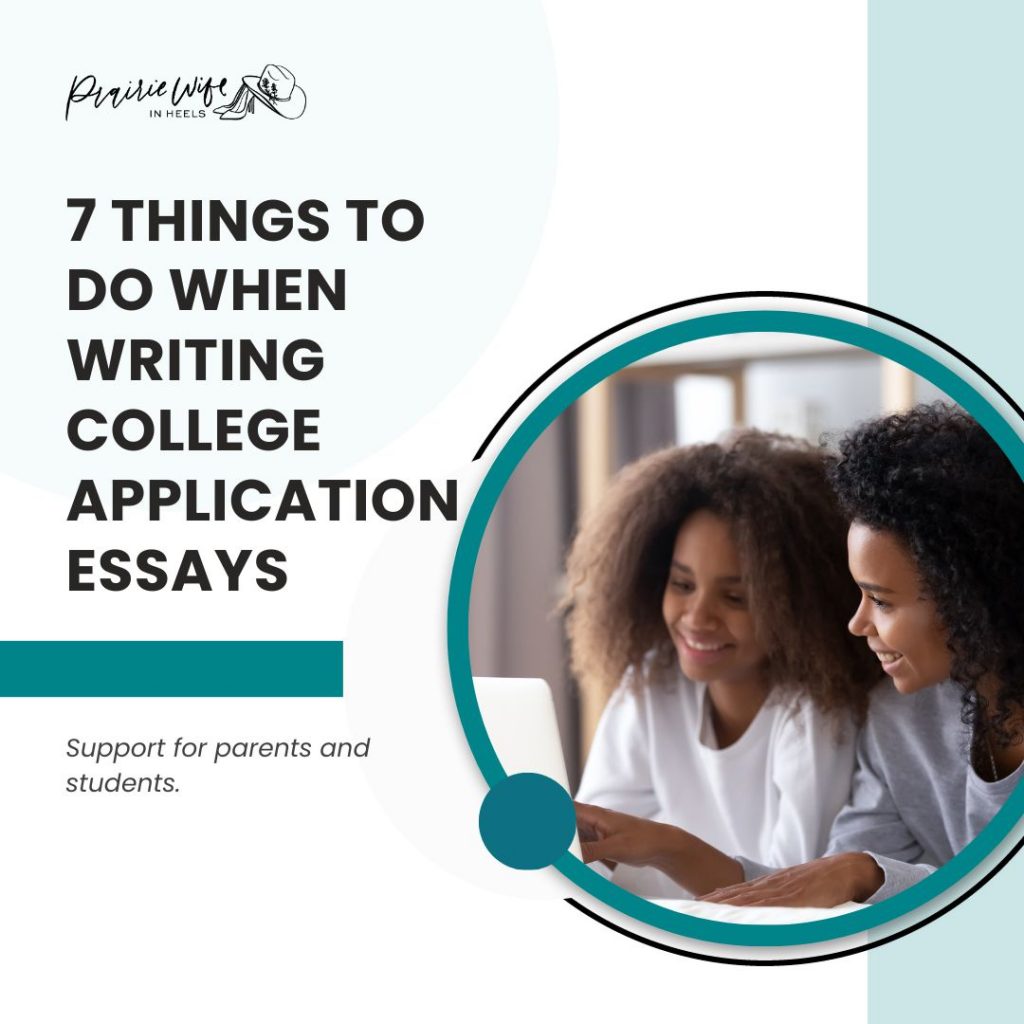7 Things To Do When Writing College Application Essays
Posted November 14, 2023 by Prairie Wife -

Writing college application essays is one of the scariest parts of the college application process.
There are several reasons for this, but I genuinely think that it’s because most people hate writing!
Thankfully (or not, depending on who/when you ask), the Cowkids have me as a mother. I make my living writing both here on the blog and as a freelance writer for various other publications.
I was actually looking forward to helping Cowboy J write his college essays because I love writing. Sadly, this was not how HE felt about the situation…but we fought worked our way through the essay process, and now that he has been accepted to multiple colleges, I feel comfortable sharing what I learned along the way with you.
Your student must do all the work for their essays.
Yes, you can help support them and even read over their work to help catch any glaring mistakes. But you won’t do your child any favors by pushing them out of the way and doing the work for them! This is absolutely something your child needs to know how to do if they plan to attend college. Essays and papers are a way of life at the higher levels of education. I can honestly say that by the end of this process, Cowboy J needed hardly any support with his last few essays. Just in the short time we worked together on his essays, he grew as a writer.

Before we begin, I want to mention that you WILL need a computer with word processing software and internet access for these essays. As I mentioned in this post about what to do before applying for college, all college applications are online now, and your essay must be typed and submitted as a PDF. If you don’t have access to this in your home, your local library will have everything you need.
- Schedule a Time: Pick a day when you won’t be bustling around doing “all the things” to tackle this project. Set aside 3 hours for the first work session. If it takes less, great…and if it takes longer, don’t stress.
- Make a List of Essays to Write: Many colleges use the “common app” form your child can fill out and then use to apply to a variety of colleges and Universities across the United States. This form requires one “Personal Statement” essay between 250-650 words long. Other colleges may require multiple short essays of 250 words responding to specific questions or a 650-word essay about one topic chosen from a list of questions. Before you start writing, list exactly what essays you must write, including word count and topic. You can then go down the list and cross off each essay as it’s written. I recommend starting with the “Personal Statement” Essay because you’ll find you can take lots of fragments from this essay and use them in your shorter responses.
- Brainstorm: What sets your child apart from other students? What makes them unique? We’ve all seen the Netflix shows or Hallmark movies where the girl whose parent died shares in their Harvard Admissions Essay how their hardship has led to their success and then gets a full ride to the Ivy League school of their dreams. While your child should share if they’ve had to overcome significant obstacles in life and the lessons they’ve learned, many kids don’t have that kind of story. Make a list of things your child enjoys, is proud of, and wants to accomplish in the future. EXAMPLES FORM MY SON’S ESSAY: Oldest of 5, lives in rural Wyoming, has traveled multiple times overseas, has a passion for the sport of wrestling, and has future plans to be an RN and then a Nurse Practitioner.
- Start with the Basics: In the “Personal Statement,” your child introduces themselves to the college. You wouldn’t start out with, “I broke my arm in a football game, and this taught me….” when you meet someone. So, don’t start your essay that way. Name, where you live, GPA, class ranking, and ACT scores are the right way to begin your essay. If any of the GPA and ACT information isn’t going to be positive for them to see right away, leave it out. Then, tell them about sports, after-school activities, and any other activities/ hobbies. Then, share your plans for the future. Why do you need/want to attend college? If you’re filling out the common app, don’t list a specific college or location because this will be going to multiple places.
- Share the Story of What Makes You Unique: This is where your child sets themselves apart from the others. It’s their time to tell the story of who they are. This is not the time to be modest. Colleges are looking for driven students who they think can leave home and make it on their own in a college setting. And they REALLY want to pick students who can flourish and succeed and make the college look good when they head out into the world after graduation. EXAMPLE FROM MY SON’S ESSAY: “From frequent trips visiting my grandparents in Milwaukee, Wisconsin, to trips to Florida and Texas, I have always enjoyed seeing what the world outside of Wyoming looks like. I was invited to participate in a two-week wrestling exchange in Spain a year ago. It was my first time traveling without my family, and I grew as an individual and wrestler.”
- End It Smoothly: When writing college essays that are under 300 words, get as close to the actual word count as possible. For more extended essays like the “Personal Statement,” it’s okay to stop 50 words short of the 650-word length. But don’t do any less than that! When writing these essays, it’s essential to end them smoothly. Use the last two sentences to discuss what you’re looking forward to in the future, and use it as one more opportunity to show you’re ready for this next step.
- Proofread, Edit, Proofread: Once your child has written their essay, it’s time for you to offer your help. Begin by reading their essay aloud (the best way to find errors) and point out any significant grammatical errors or spots where their writing stumbles or doesn’t make sense. Don’t fix it for them! Just ask questions or offer suggestions that may make their message more clear. It can be tempting to pull out the thesaurus in an attempt to make your child’s essay sound more sophisticated. But if your child would never use the words “thrilled” or “conflicted” in real life, don’t use it in their essay. Watch for the same word used repeatedly, a common writing error, and don’t be afraid to use Grammarly to help find any errors you two may have missed. Lastly, have your child send the essay to one or two adults who know them well and ask them to read it and see if they have any suggestions.
Repeat this process with each essay, and as I stated previously, don’t be afraid to use parts of your longer “Personal Statement” to answer shorter essay questions.

I want to remind you again that while this process may be painful challenging for you and your child, it’s vital that you are only there for support. Part of the reason colleges want students to write essays is to get to “know” them. But for lack of a better phrase, it also weeds out the weak ones. If you constantly fight your student about writing essays or find that the process results in tears and frustration every single time, it may be a sign that your child isn’t ready for college life.
If this is the case, have an open and honest conversation with them about where they want to be in three years, and maybe take a step back and see if it’s time for some of your own expectations for your child to change.
Questions, comments, or concerns? Let me know in the comments!
Categories: Life As It Happens, Parenting
Tags: , college, college application essays, college applications, parenting, senior year, teenagers, teens, writing college essays, writing essays
Previous Post « Creamy Chicken and Broccoli Pasta
Next Post Mama Mantra: Rights vs. Privileges »




